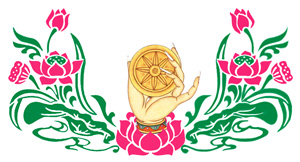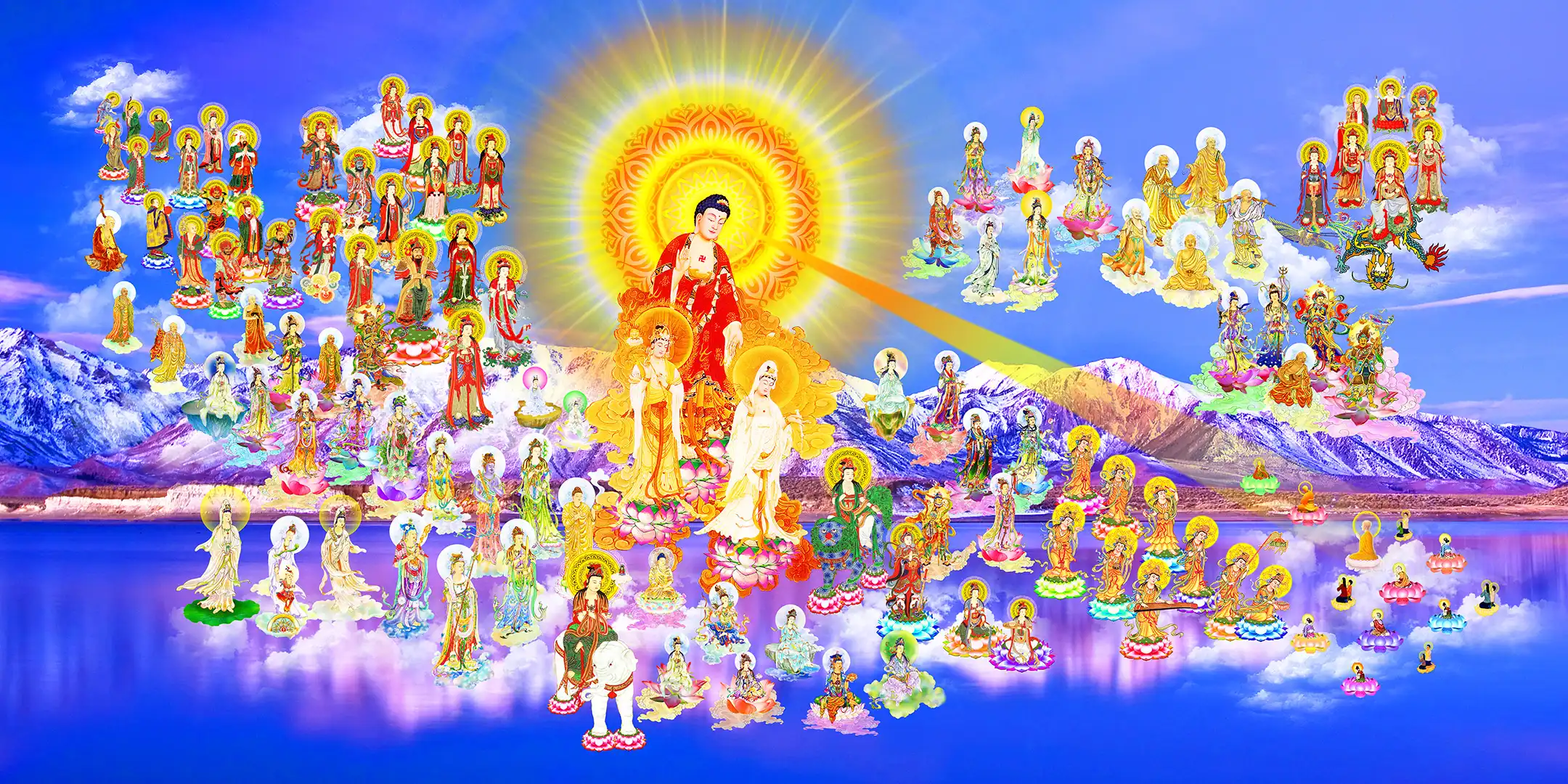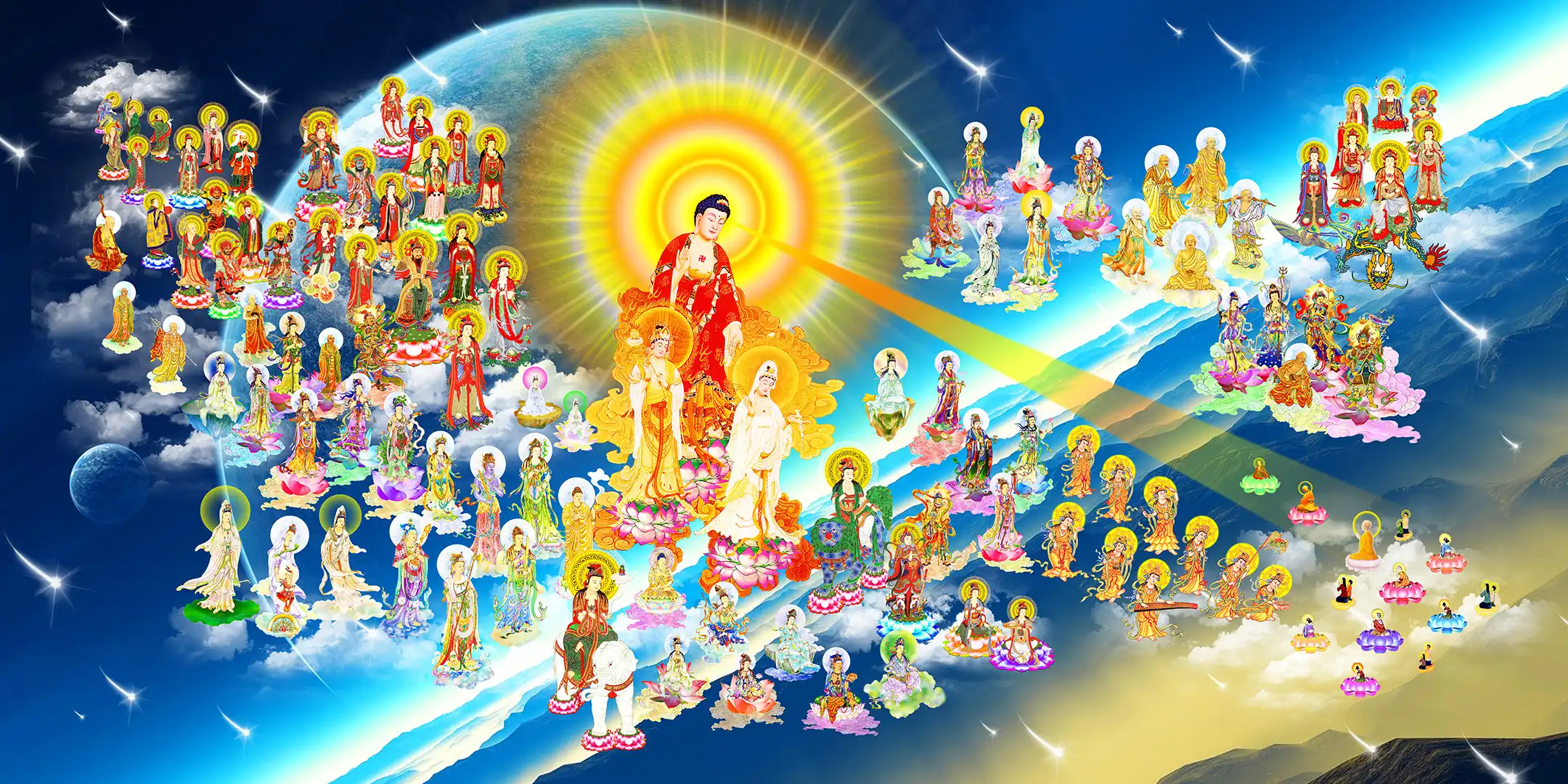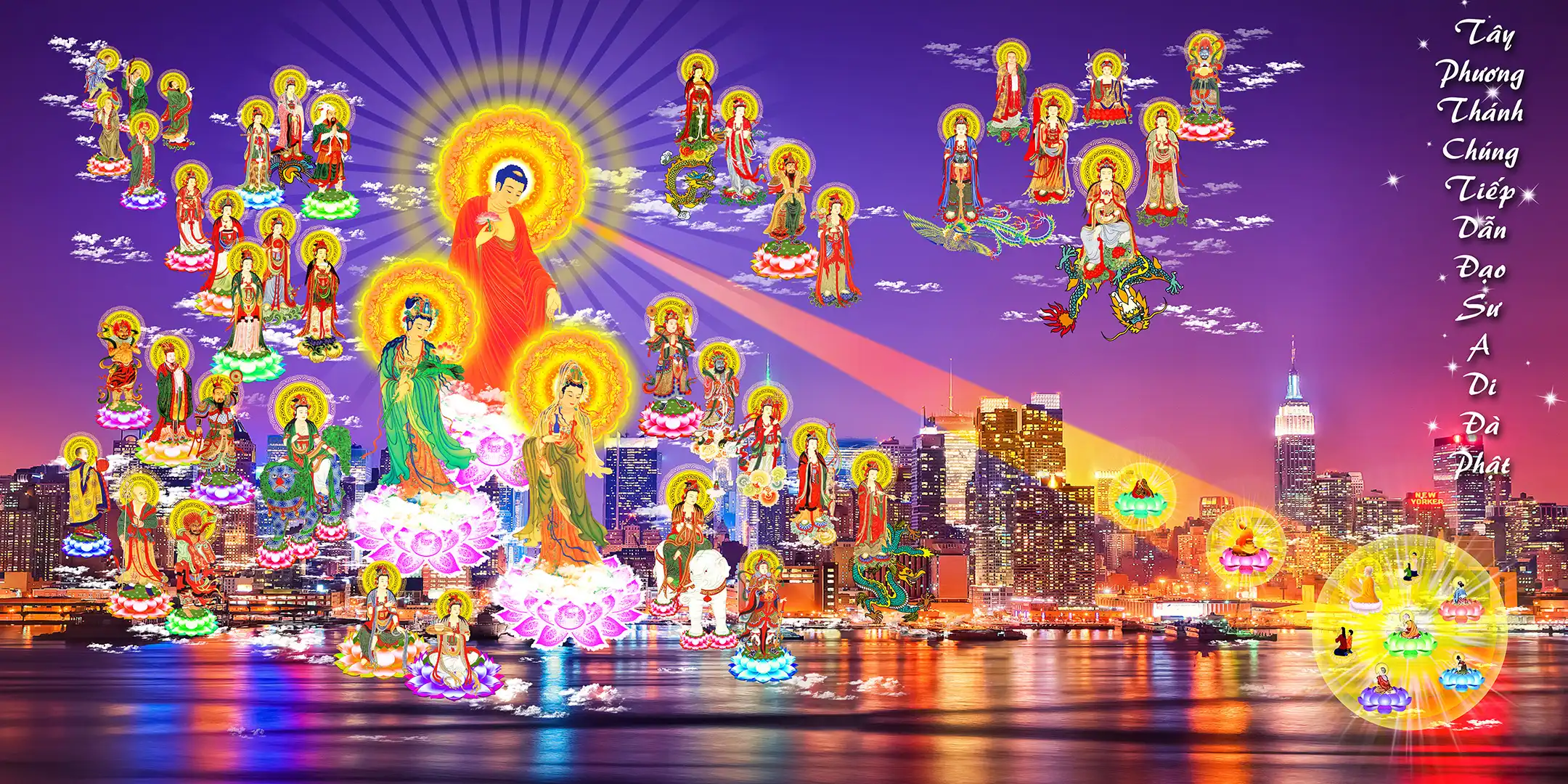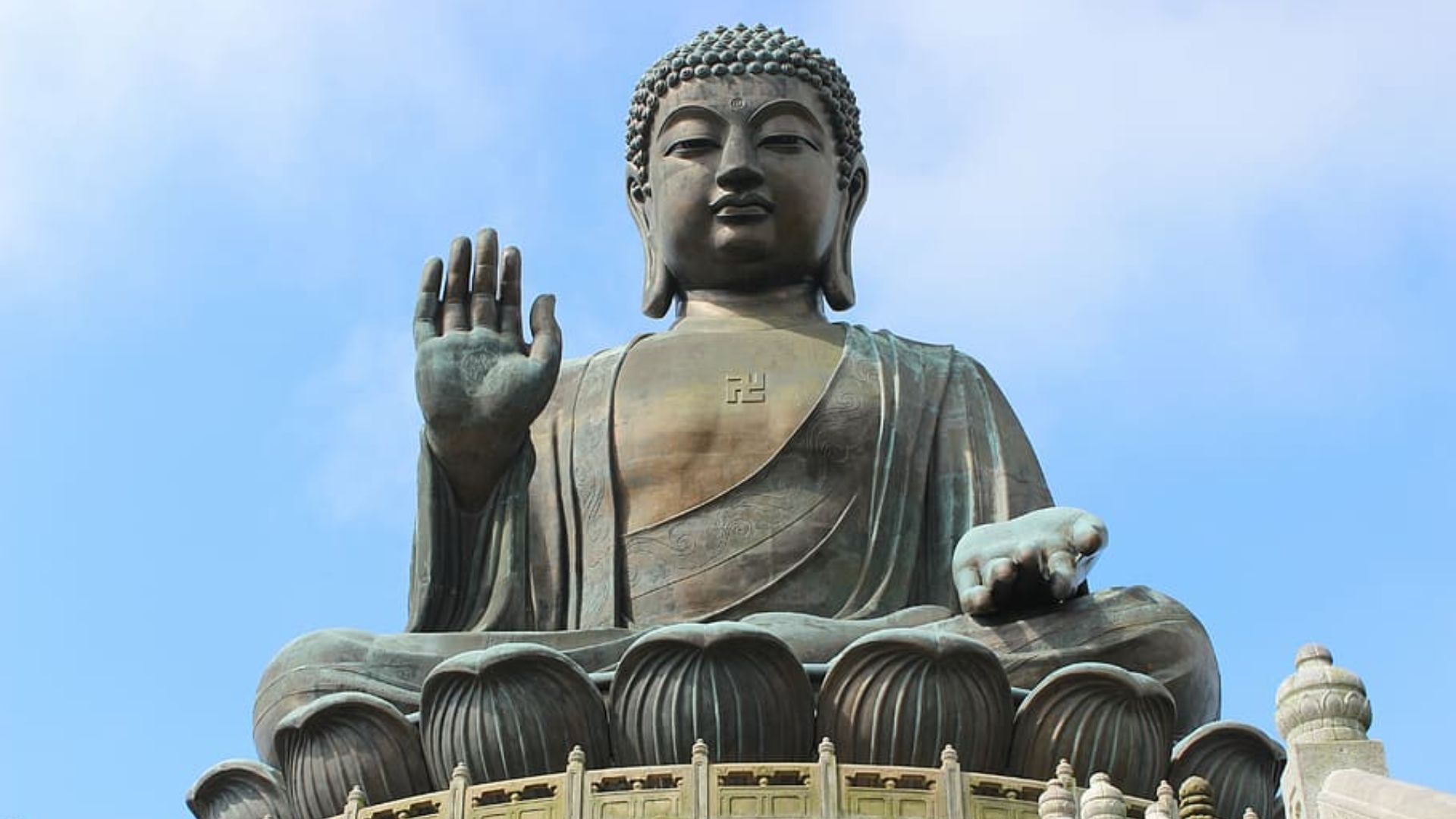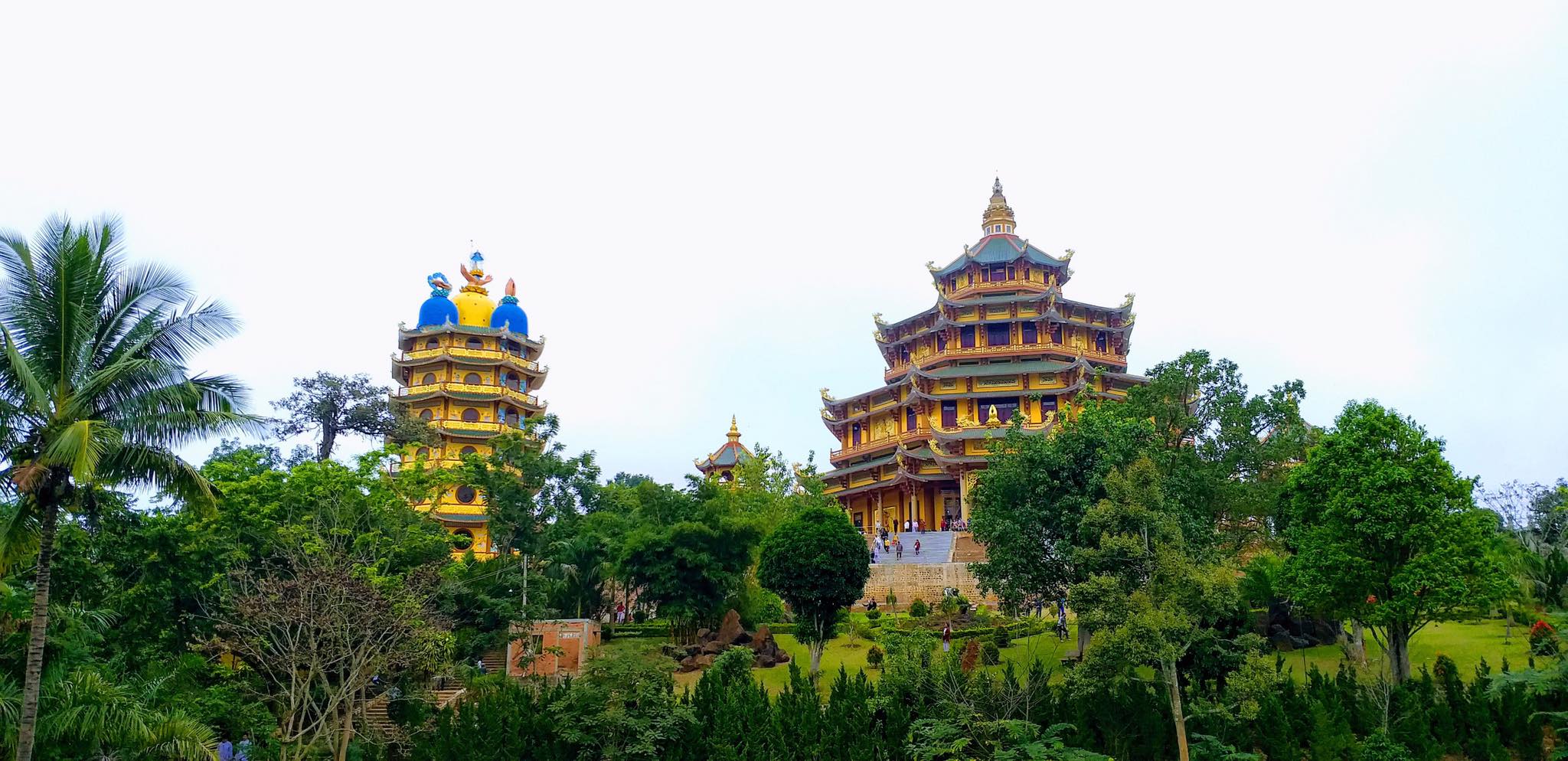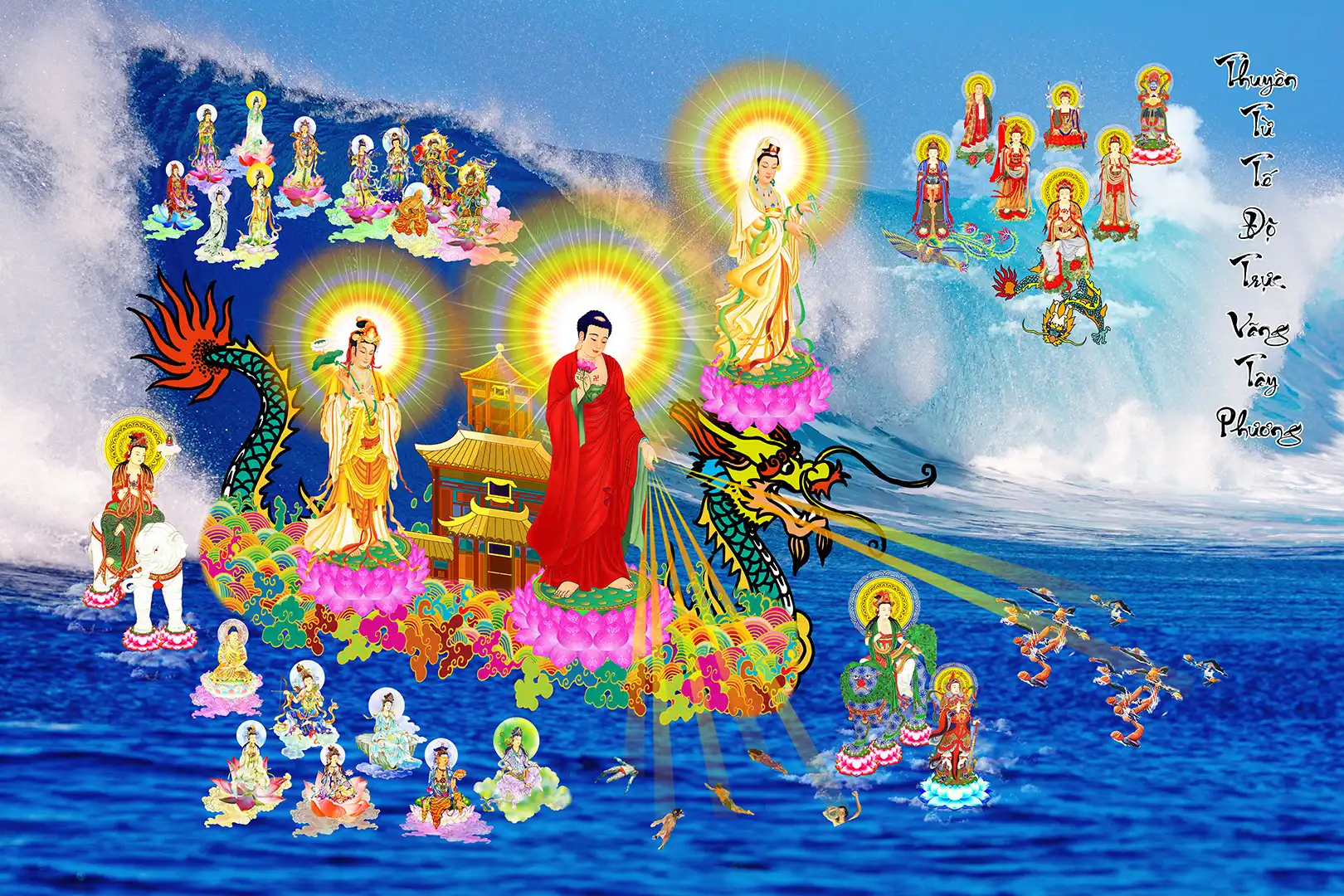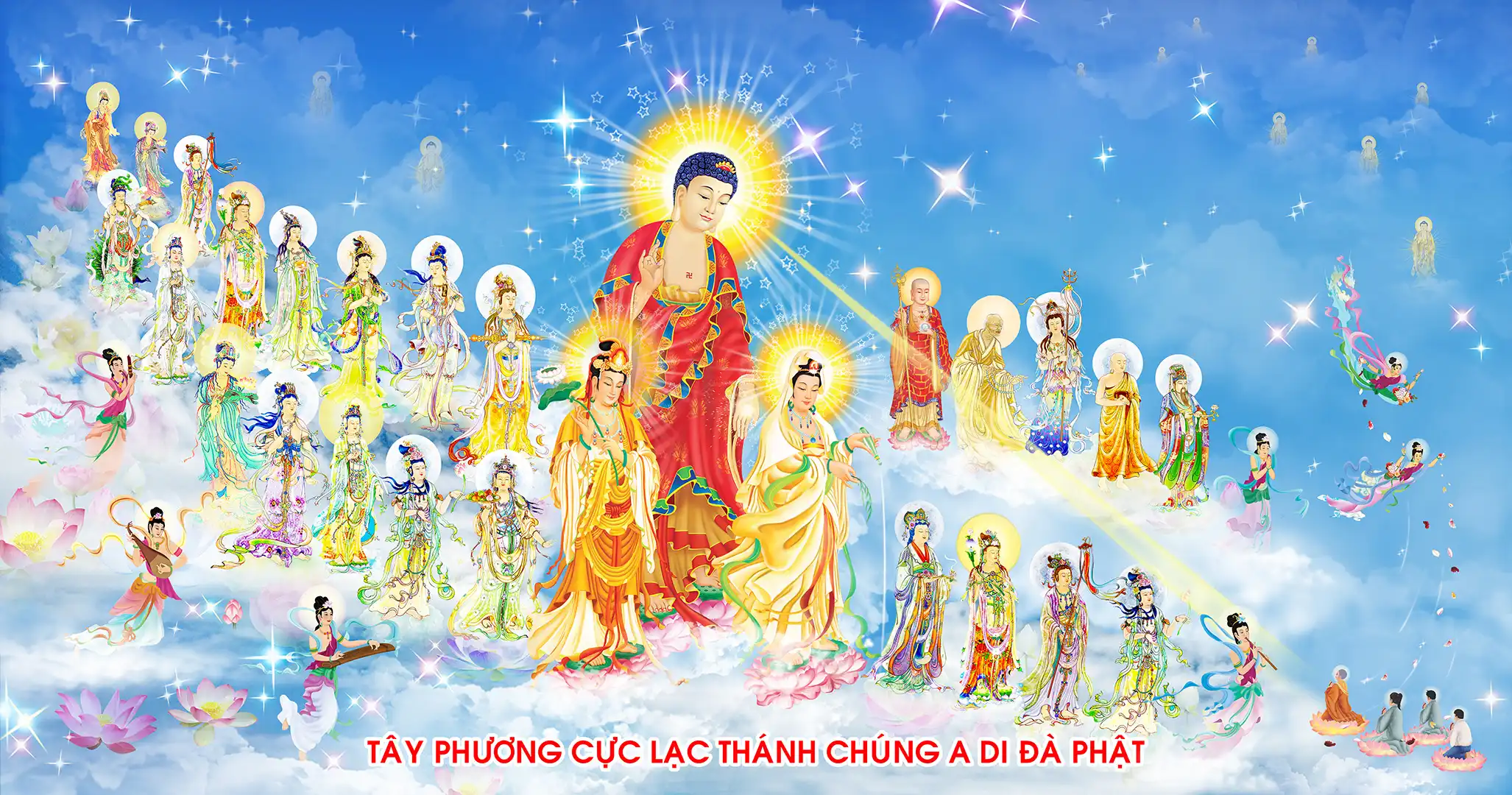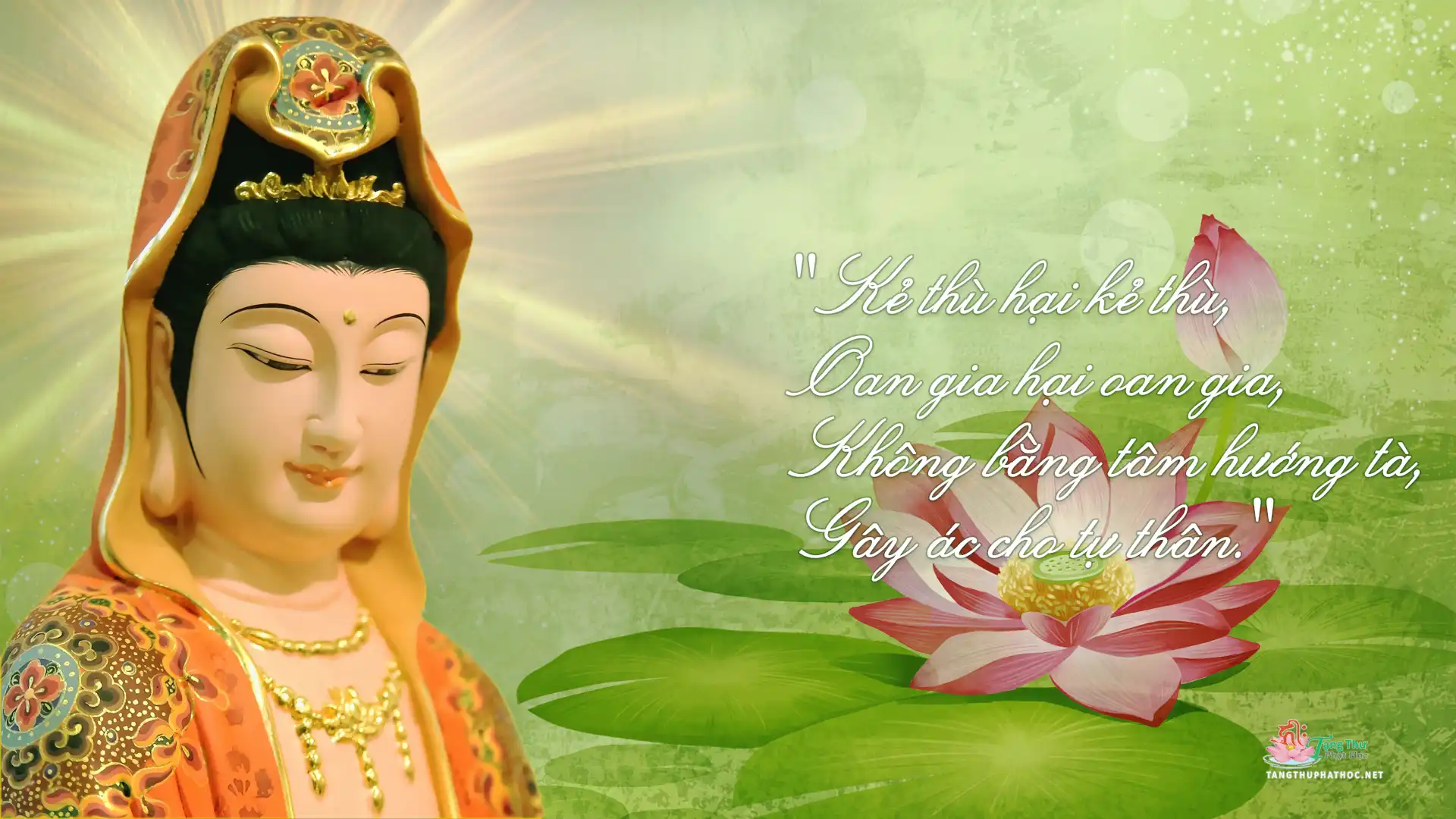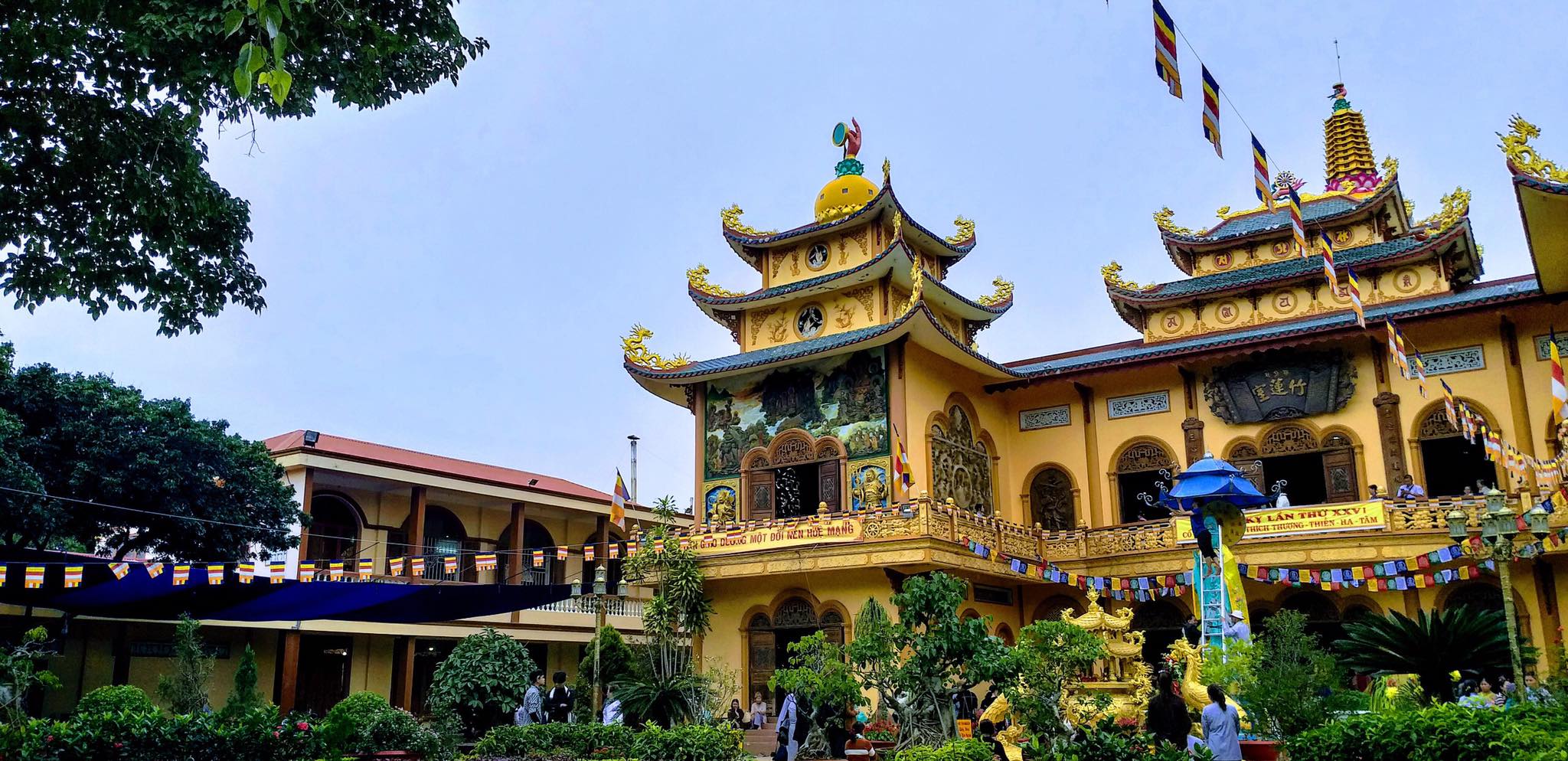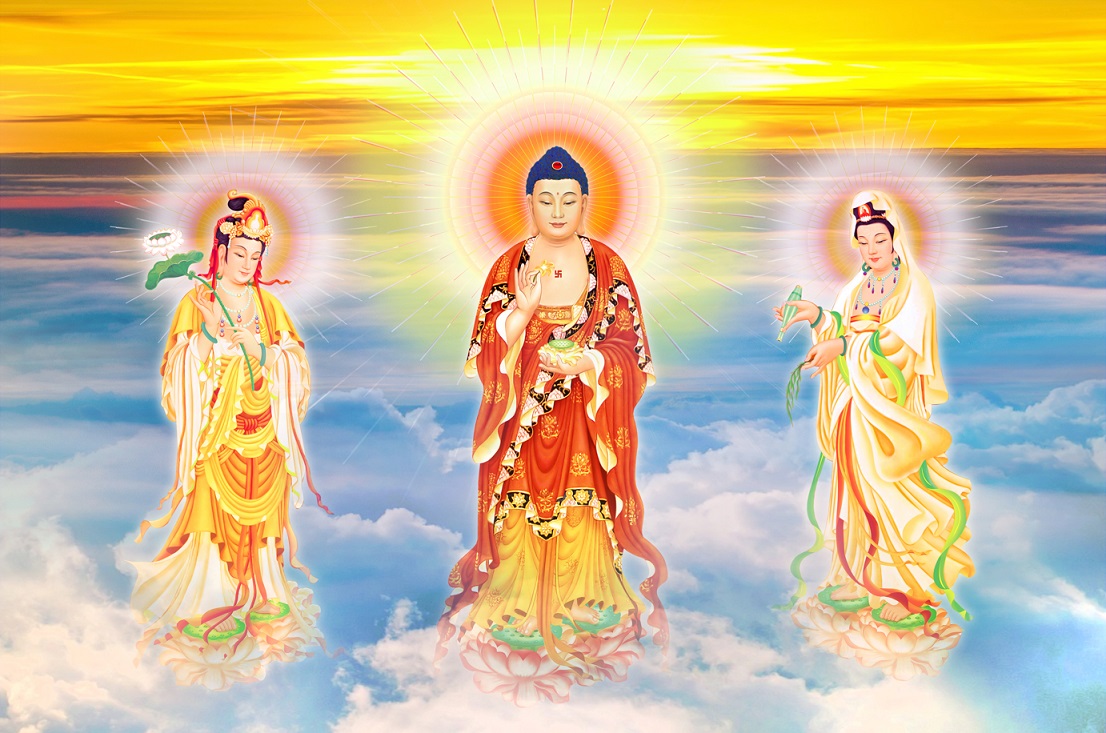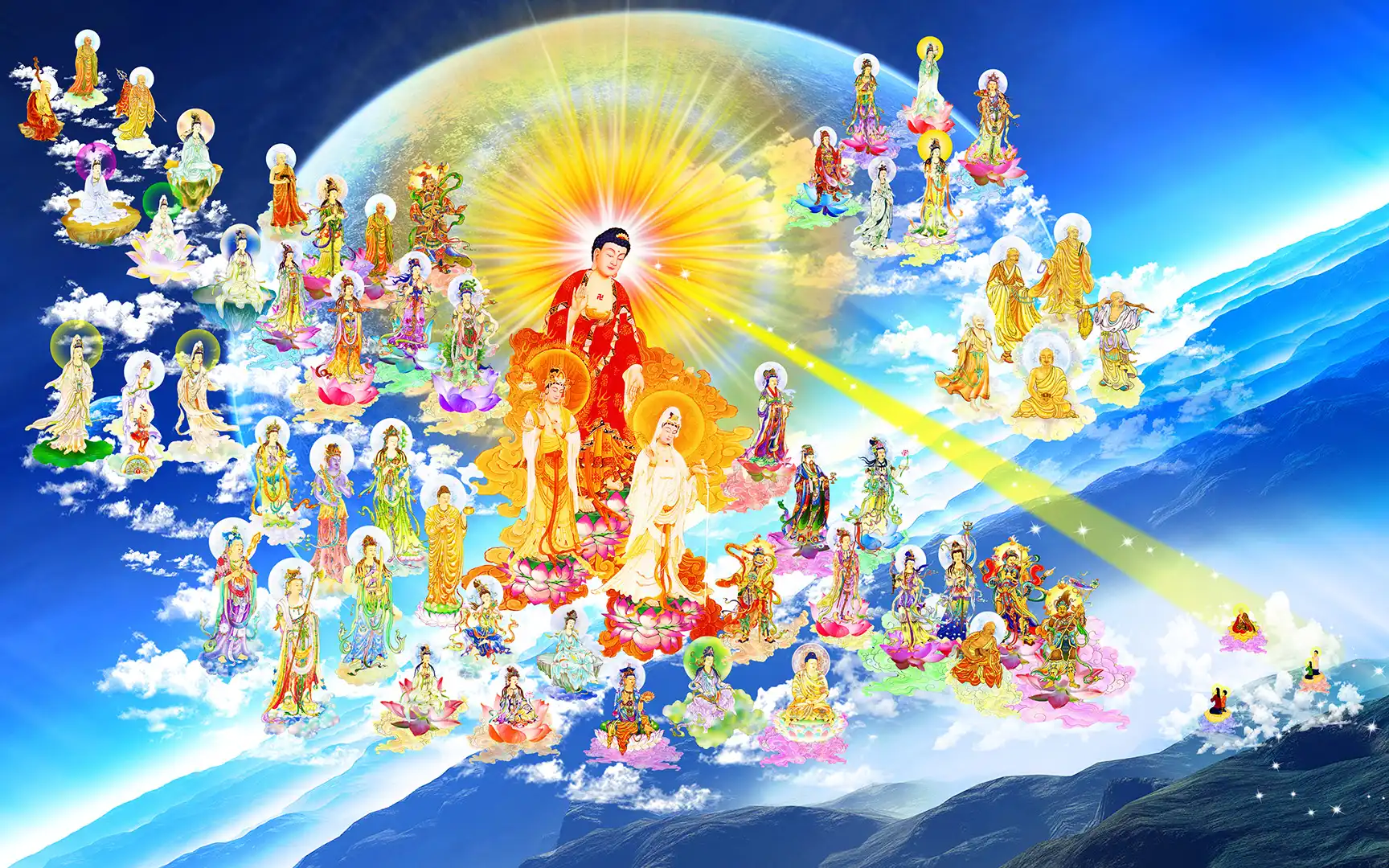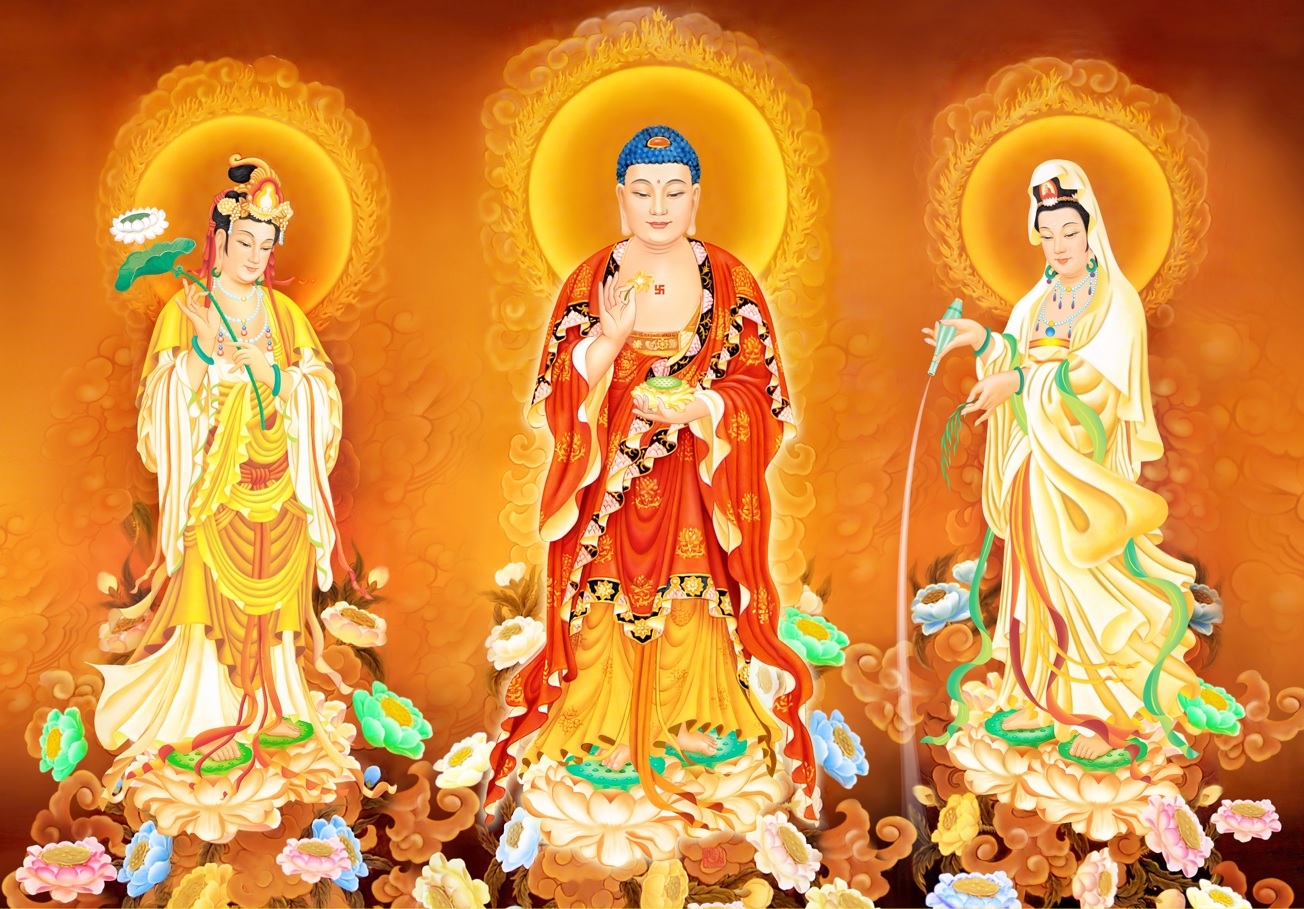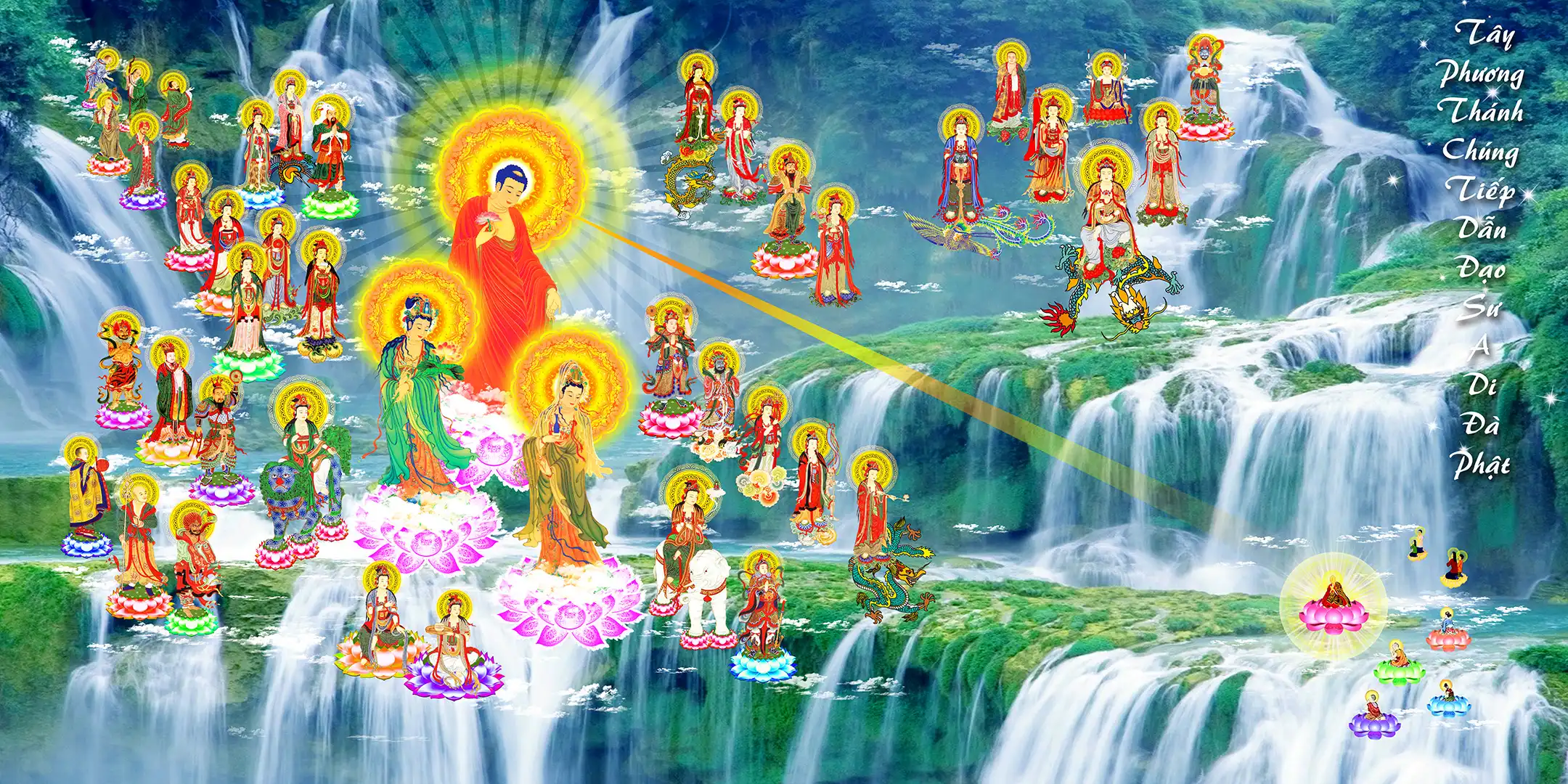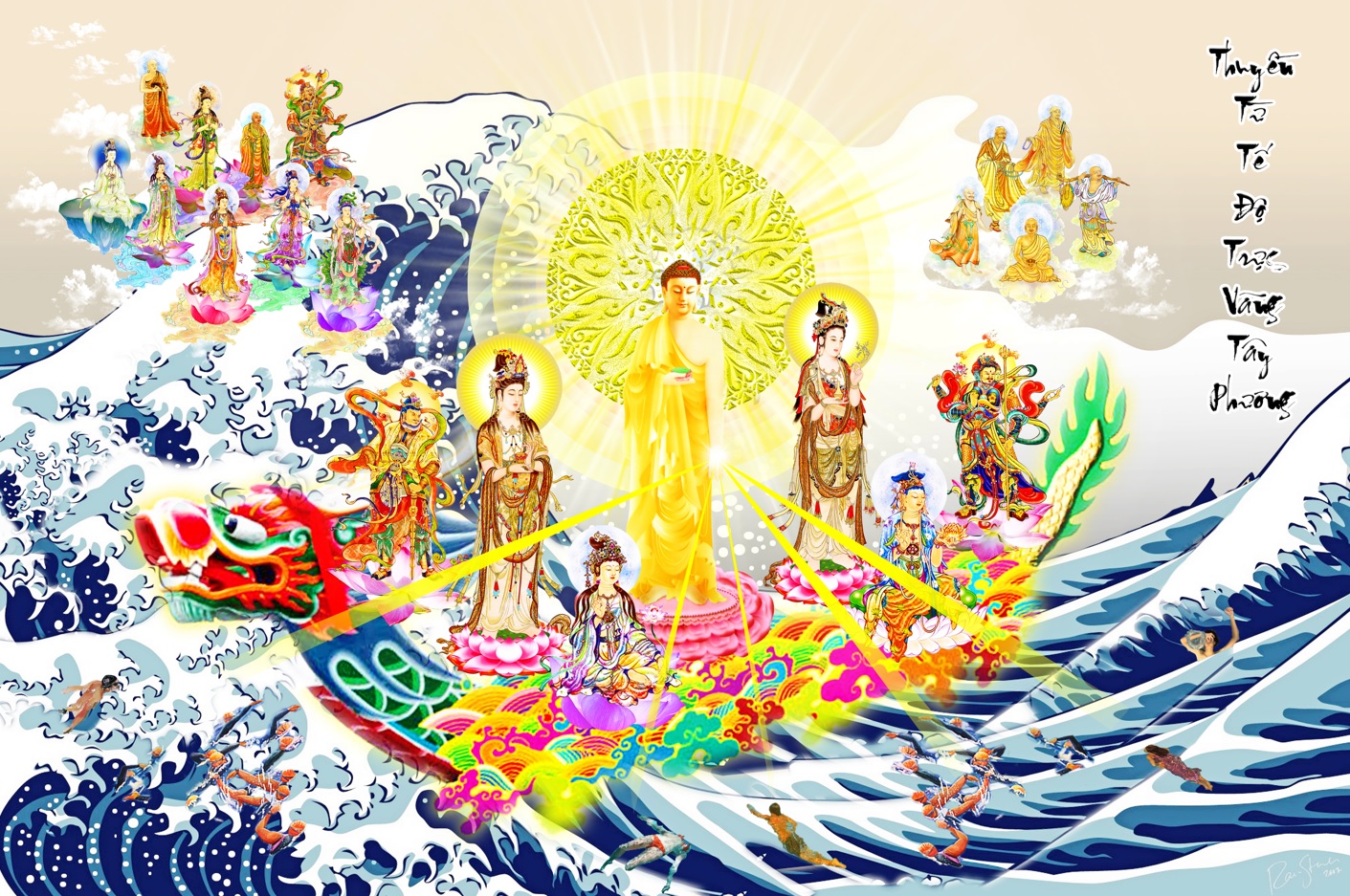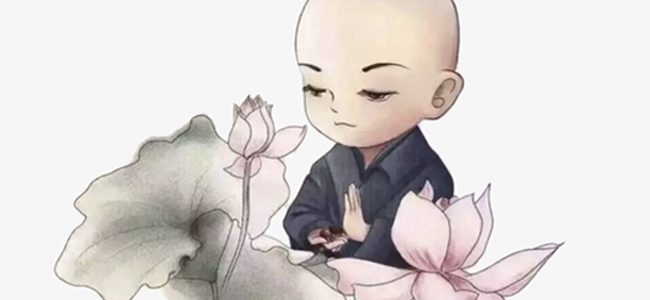Tổ Đình Minh Đăng Quang
PHẬT HỌC TỪ ĐIỂN – BUDDHIST DICTIONARY
Thiện Phúc
PHỤ LỤC (APPENDICES)
PHỤ LỤC K – Appendix K
Kinh Duy Ma Cật
The Vimalakirti Sutra
CHƯƠNG BẢY-CHAPTER SEVEN
PHẨM QUÁN CHÚNG SANH—LOOKING at LIVING BEINGS
Ngài Văn Thù Sư Lợi hỏi ông Duy Ma Cật: “Bồ Tát quán sát chúng sanh phải như thế nào?”—Manjusri asked Vimalakirti: “How should a Bodhisattva look at living beings?”
Duy Ma Cật đáp: “Ví nhà huyễn thuật thấy người huyễn của mình hóa ra, Bồ Tát quán sát chúng sanh cũng như thế. Như người trí thấy trăng dưới nước, thấy mặt trong gương, như ánh nắng dợn, như âm vang của tiếng, như mây giữa hư không, như bọt nước, như bóng nổi, như lõi cây chuối, như ánh điển chớp, như đại thứ năm, như ấm thứ sáu, như căn thứ bảy, như nhập thứ mười ba, như giới thứ mười chín. Bồ Tát quán sát chúng sanh cũng như thế. Như sắc chất cõi vô sắc, như mộng lúa hư, như thân kiến của Tu Ðà Hoàn, như sự nhập thai của A Na Hàm, như tam độc của A la hán, như tham giận phá giới của Bồ Tát chứng vô sanh pháp nhẫn, như tập khí phiền não của Phật, như mù thấy sắc tượng, như hơi thở ra vào của người nhập diệt tận định, như dấu chim giữa hư không, như con của thạch nữ (đàn bà không sanh đẻ), như phiền não của người huyễn hóa, như cảnh chiêm bao khi đã thức, như người diệt độ thọ lấy thân, như lửa không khói. Bồ Tát quán sát chúng sanh cũng như thế đó.”—Vimalakirti replied: “ A Bodhisattva should look at living beings like an illusionist does at the illusory men (he has created); and like a wise man looking at the moon’s reflection in water; at his own face in a mirror; at the flame of a burning fire; at the echo of a calling voice; at flying clouds in the sky; at foam in a liquid; at bubbles on water; at the (empty) core of a banana tree; at a flash of lightning; at the (non-existent) fifth element (beside the four that make the human body); at the sixth aggregate (beside the five that make a sentient being); at the seventh sense datum (beside the six objects of sense); at the thirteenth entrance (ayatana-beside the twelve involving the six organs and six sense date); at the nineteenth realm of sense (beside the eighteen dhatus or fields of sense); at form in the formless world; at the (non-existent) sprout of a charred grain of rice; at a body seen by a srota-apanna (who has wiped out the illusory body to enter the holy stream); at the entry of an anagamin (or a non-returning sravaka) into the womb of a woman (for rebirth); at an arhat still preserving the three poisons (of desire, anger and stupidity which he has eliminated forever); at a Bodhisattva realizing the patient endurance of the uncreate who is still greedy, resentful and breaking the prohibitions; at a Buddha still suffering from klesa (troubles); at a blind man seeing things; at an adept who still breathes air in and out while in the state of nirvanic imperturbability; at the tracks of birds flying in the air; at the progeny of a barren woman; at the suffering of an illusory man; at a sleeping man seeing he is awake in a dream; at a devout man realizing nirvana who takes a bodily form for (another) reincarnation; and at a smokeless fire. This is how a Bodhisattva should look at living beings.”
Khi ấy Ngài Văn Thù Sư Lợi hỏi: “Nếu Bồ Tát quán sát như thế thì phải thực hành lòng từ như thế nào?”—At that time, Manjusri asked Vimalakirti: “When a Bodhisattva so meditates how should he practise kindness (maitri)?
Duy Ma Cật đáp—Vimalakirti replied: Bồ Tát quán sát như thế rồi phải tự nghĩ rằng—When a Bodhisattva has made this meditation, he should think that:
·Phải vì chúng sanh nói pháp như trên, đó là lòng từ chân thật: Ought to teach living beings to meditate in the same manner; this is true kindness.
·Phải thực hành lòng từ tịch diệt, bởi vì không sanh: Should practise causeless (nirvanic) kindness which prevents creativeness;
·Phải thực hành lòng từ không nóng bức, bởi không có phiền não: Should practice unheated kindness which puts an end to klesa (troubles and causes of troubles);
·Phải thực hành lòng từ bình đẳng, bởi ba đời như nhau: Should practice impartial kindness which coves all the three periods of time (which means that it is eternal involving past, future and present);
·Phải thực hành lòng từ không đua tranh, bởi không có khởi: Should practice passionless kindness which wipes out disputes;
·Phải thực hành lòng từ không hai, bởi trong ngoài (căn trần) không hiệp: Should practice non-dual kindness which is beyond sense organs within and sense data without;
·Phải thực hành lòng từ không hoại, bởi hoàn toàn không còn: Should practice indestructible kindness which eradicates all corruption;
·Phải thực hành lòng từ kiên cố, bởi lòng không hủy hoại: Should practice stable kindness which is a characteristic of the undying self-mind;
·Phải thực hành lòng từ thanh tịnh, bởi tánh các pháp trong sạch: Should practice pure and clean kindness which is spotless like Dharmata;
·Phải thực hành lòng từ vô biên, bởi như hư không: Should practice boundless kindness which is all-pervasive like space;
·Phải thực hành lòng từ của A la hán, vì phá các giặc kiết sử: Should practice the kindness of the arhat stage which destroys all bondage;
·Phải thực hành lòng từ Bồ Tát, ví an vui chúng sanh: Should practice the Bodhisattva kindness which gives comfort to living beings;
·Phải thực hành lòng từ của Như Lai, vì đặng tướng như như: Should practice the Tathagata kindness which leads to the state of thatness;
·Phải thực hành lòng từ của Phật, vì giác ngộ chúng sanh: Should practice the Buddha kindness which enlightens all living beings;
·Phải thực hành lòng từ tự nhiên, vì không nhơn đâu mà đặng: Should practice spontaneous kindness which is causeless;
·Phải thực hành lòng từ Bồ Ðề, vì chỉ có một vị: Should practice Bodhi kindness which is one flavour (i.e. uniform and unmixed wisdom);
·Phải thực hành lòng từ vô đẳng, vì đoạn các ái kiến: Should practice unsurpassed kindness which cuts off all desires;
·Phải thực hành lòng từ đại bi dẫn dạy cho pháp Ðại Thừa: Should practice merciful kindness which leads to the Mahayana (path);
·Phải thực hành lòng từ không nhàm mỏi, quán không, vô ngã: Should practice untiring kindness because of deep insight into the void and non-existent ego;
·Phải thực hành lòng từ pháp thí không có luyến tiếc: Should practice Dharma-bestowing (dana) kindness which is free from regret and repentance;
·Phải thực hành lòng từ trì giới để hóa độ người phá giới: Should practice precepts (sila) upholding kindness to convert those who have broken the commandments;
·Phải thực hành lòng từ nhẫn nhục để ủng hộ người và mình: Should practice patient (ksanti) kindness which protects both the self and others;
·Phải thực hành lòng từ tinh tấn để gánh vác chúng sanh: Should practice Zealous (virya) kindness to liberate all living beings;
(w1) Phải thực hành lòng từ thiền định không thọ mùi thiền: Should practice serene (dhyana) kindness which is unaffected by the five senses;
(w2) Phải thực hành lòng từ trí tuệ, đều biết đúng nhịp: Should practice wise (prajna) kindness which is always timely;
(w3) Phải thực hành lòng từ phương tiện, thị hiện tất cả: Should practice expedient (upaya) kindness to appear at all times for converting living beings;
(w4) Phải thực hành lòng từ không ẩn dấu, lòng ngay trong sạch: Should practice unhidden kindness because of the purity and cleanliness of the straightforward mind;
(w5) Phải thực hành lòng từ thâm tâm, không có hạnh xen tạp: Should practice profound minded kindness which is free from discrimination;
(w6) Phải thực hành lòng từ không phỉnh dối, không có lừa gạt: Should practice undeceptive kindness which is without fault;
(w7) Phải thực hành lòng từ an vui, làm cho tất cả được sự an vui của Phật. Lòng từ của Bồ Tát là như thế đó: Should practice joyful kindness which bestows the Buddha joy (in nirvana). “Such are the specialities of Bodhisattva kindness.”
Ngài Văn Thù Sư Lợi hỏi: “Sao gọi là lòng bi?”—Manjusri asked Vimalakirti: “What should be his compassion (karuna)?”
Duy Ma Cật đáp: “Bồ Tát làm công đức gì cốt để cho chúng sanh.”—Vimalakirti replied: “His compassion should include sharing with all living beings all the merits he has won.”
Văn Thù Sư Lợi hỏi: “Sao gọi là lòng hỷ?”—Manjusri asked: “What should be his joy (mudita)?”
Duy Ma Cật trả lời: “Có lợi ích gì đều hoan hỷ, không hối hận.”—Vimalakirti replied: He should be filled with joy on seeing others win the benefit of the Dharma with no regret whatsoever.”
Văn Thù Sư Lợi hỏi: “Sao gọi là lòng xả?”—Manjusri asked “What should he relinquish (upeksa)?”
Duy Ma Cật đáp: “Những phước báo đã làm, không có lòng hy vọng.”—Vimalakirti replied: “In his work of salvation, he should expect nothing (i.e. no gratitude or reward) in return.”
Ngài Văn Thù Sư Lợi hỏi: “Sự sanh tử đáng sợ, Bồ Tát phải y nơi đâu?”—Manjusri asked: “On what should he rely in his fear of birth and death?”
Ông Duy Ma Cật đáp: “Bồ Tát ở trong sanh tử đáng sợ đó, phải y nơi sức công đức của Như Lai.”—Vimalakirti replied: “He should rely on the power of the Tathagata’s moral merits.”
Ngài Văn Thù Sư Lợi hỏi: “Bồ Tát muốn y sức công đức của Như Lai, phải trụ nơi đâu?”—Manjusri asked: “What should he do to win support from the power of the Tathagata’s moral merits?”
Duy Ma Cật đáp: “Bồ Tát muốn y sức công đức của Như Lai, phải trụ nơi chỗ độ thoát tất cả chúng sanh.”—Vimalakirti replied: “ He should liberate all living beings in order to win support from the power of the Tathagata’s moral merit.”
Văn Thù lại hỏi: “Muốn độ chúng sanh phải trừ những gì?”—Manjusri asked: “What should he wipe out in order to liberate living beings?”
Duy Ma Cật đáp: “Muốn độ thoát chúng sanh trước hết phải trừ phiền não của họ.”—Vimalakirti replied: “When liberating living beings, a Bodhisattva should first wipe out their klesa (troubles and causes of troubles)?”
Văn Thù hỏi: “Muốn trừ phiền não, phải thực hành những gì?”—Manjusri asked: “What should he do to wipe out klesa?”
Duy Ma Cật đáp: “Phải thực hành chánh niệm.”—Vimalakirti replied: “He should uphold right mindfulness.” Văn Thù hỏi: “Thế nào là thực hành chánh niệm?”—Manjusri asked: “What should he do to uphold right mindfulness?”
Duy Ma Cật đáp: Phải thực hành pháp không sanh không diệt: Vimalakirti replied: “He should advocate the unborn and the undying.”
Văn Thù hỏi: “Pháp gì không sanh, pháp gì không diệt? “Manjusri asked: “What is the unborn and what is the undying?”
Pháp bất thiện không sanh, pháp thiện không diệt: Vimalakirti replied: “The unborn is evil that does not arise and the undying is good that does not end.”
Văn Thù hỏi: “Pháp thiện và pháp bất thiện lấy gì làm gốc?”—Manjusri asked: “What is the root of good and evil?”
Duy Ma Cật đáp: “Lấy thân làm gốc.”—Vimalakirti replied: “The body is the root of good and evil.”
Văn Thù hỏi: “Thân lấy gì làm gốc?”—Manjusri asked: “What is the root of the body?”
Duy Ma Cật đáp: “Lấy tham dục làm gốc.”—Vimalakirti replied: “Craving is the root of the body.”
Văn Thù hỏi: “Tham dục lấy gì làm gốc?”—Manjusri asked: “What is the root of craving?”
Duy Ma Cật đáp: “Lấy hư vọng phân biệt làm gốc.”—Vimalakirti replied: “Baseless discrimination is the root of craving.”
Văn Thù hỏi: “Hư vọng phân biệt lấy gì làm gốc?”—Manjusri asked: “What is the root of baseless discrimination?”
Duy Ma Cật đáp: “Lấy tưởng điên đảo làm gốc.”—Vimalakirti replied: “Inverted thinking is the root of discrimination.”
Văn Thù hỏi: “Tưởng điên đảo lấy gì làm gốc?”—Manjusri asked: “What is the root of inverted thinking?”
Duy Ma Cật đáp: “Lấy không trụ làm gốc.”—Vimalakirti replied: “Non-abiding is the root of inverted thinking.”
Văn Thù hỏi: “Không trụ lấy gì làm gốc?”—Manjusri asked: “What is the root of non-abiding?”
Duy Ma Cật đáp: “Không trụ thì không gốc. Thưa ngài Văn Thù, ở nơi gốc không trụ mà lập tất cả pháp.”—Vimalakirti replied: “Non-abiding is rootless. Manjusri, from this non-abiding root all things arise.”
Bấy giờ trong nhà ông Duy Ma Cật có một Thiên nữ thấy các vị trời, người đến nghe Pháp, liền hiện thân ra tung rải hoa trời trên mình các vị Bồ Tát và đại đệ tử. Khi hoa đến mình các vị Bồ Tát đều rơi hết, đến các vị đại đệ tử đều mắc lại. Các vị đại đệ tử dùng hết thần lực phủi hoa mà hoa cũng không rớt—A goddess (devakanya) who had watched the gods (devas) listening to the Dharma in Vimalakirti’s room appeared in bodily form to shower flowers on the Bodhisattvas and the chief disciples of the Buddha (in their honour). When the flowers fell on the Bodhisattvas, they fell to the ground, but when they fell on the chief disciples, they stuck to their bodies and did not drop in spite of all their efforts to shake them off.
Lúc ấy, Thiên nữ hỏi ngài Xá Lợi Phất: “Tự sao mà phủi hoa?”—At that time, the goddess asked Sariputra why he tried to shake the flowers off.
Xá Lợi Phất đáp: “Hoa nầy không như pháp nên phủi.”—Sariputra replied: “I want to shake off these flowers which are not in the state of suchness.”
·Thiên nữ nói: “Chớ bảo hoa nầy là không như pháp. Vì sao? Hoa nầy nó không có phân biệt, tự nhân giả phân biệt đó thôi! Nếu người xuất gia ở trong Phật pháp có phân biệt là không như pháp, nếu không phân biệt là như pháp. Ðấy, xem các vị Bồ Tát, hoa có dính đâu? Vì các ngài đã đoạn hết tưởng phân biệt. Ví như người lúc hồi hộp sợ, thời phi nhơn mới thừa cơ hại được. Như thế, các vị đại đệ tử vì sợ sanh tử nên sắc, thanh, hương, vị, xúc mới thừa cơ được, còn người đã lìa được sự sợ sệt thì tất cả năm món dục không làm chi được. Do tập khí kiết sử chưa dứt hết nên hoa mới mắc nơi thân thôi, còn người kiết tập hết rồi, hoa không mắc được.”—The goddess said: “Do not say these flowers are not in the state of suchness. Why? Because they do not differentiate, and it is you (alone) who give rise to differentiation. If you (still) differentiate after leaving home in your quest of Dharma, this is not the state of suchness, but if you no longer give rise to differentiation, this will be the state of suchness. Look at the Bodhisattvas whose bodies do not retain the flowers this is because they have put an end to differentiation. This is like a man taking fright who invites trouble for himself is like a man taking right and evil (people). So if a disciple fears birth and death, then form, sound, smell, taste and touch can trouble him, but if he is fearless he is immune from all the five sense data. (in your case). It is because the force of habit still remains that these flowers cleave to your body but if you cut it off, they will not stick to it.”
·Xá Lợi Phất hỏi: “Thiên nữ ở nhà nầy được bao lâu?”—Sariputra asked: “How long have you been in this room?”
·Thiên nữ đáp: “Tôi ở nhà nầy in như Ngài được giải thoát.”—The goddess replied: “My stay in this room is just like the Venerable Elder’s liberation.”
·Xá Lợi Phất hỏi: “Ở đây đã lâu ư?”—Sariputra asked: “Do you then mean that you have stayed here for a long time?”
·Thiên nữ đáp: “Ngài giải thoát đã lâu như thế nào?—The goddess retorted: “Does your liberation also involve time?”
·Ngài Xá Lợi Phất nín lặng không đáp—Sariputra kept silent and did not reply.
·Thiên nữ nói: “Tại sao bực kỳ cựu đại trí lại nín lặng?”—The goddess then asked: “Why is the wise elder silent on this point?”
·Xá Lợi Phất trả lời: “Giải thoát không có ngôn thuyết, nên ở nơi đó ta không biết nói làm sao!”—Sariputra replied: “He who wins liberation does not express it in words; hence I do not know what to say!”
·Thiên nữ nói: “Ngôn thuyết văn tự đều là tướng giải thoát. Vì sao? Vì giải thoát không ở trong, không ở ngoài, không ở hai bên; văn tự cũng không ở trong, không ở ngoài, không ở hai bên. Thế nên, ngài Xá Lợi Phất, chớ rời văn tự mà nói giải thoát. Vì sao? Vì tất cả pháp là tướng giải thoát.”—The goddess said: “Spoken and written word reveal liberation. Why? For liberation is neither within nor without nor in between, and words also are neither inside nor outside nor in between. Therefore, Sariputra, liberation cannot be preached without using words. Why? Because all things point to liberation.”
·Xá Lợi Phất hỏi: “Không cần ly dâm, nộ, si, được giải thoát ư?”—Sariputra asked: “Do you then mean that thee is no need to keep from carnality, hatred and stupidity to win liberation?”
·Thiên nữ nói: “Phật vì kẻ tăng thượng mạn nói ly dâm, nộ, si là giải thoát thôi, nếu kẻ không tăng thượng mạn thời Phật nói tánh của dâm nộ, si là giải thoát.”—The goddess replied: “In the presence of those who are proud (of their superior knowledge) the Buddha said it is important to keep from carnality, hatred and stupidity in the quest of liberation; but where they are absent, He said that the underlying nature of carnality, hatred and stupidity (i.e. the self-nature) is identical with liberation.
·Xá Lợi Phất nói: “Hay thay! Hay thay! Thiên nữ! Nàng được cái gì, chứng cái gì mà biện tài như thế?”—Sariputra exclaimed: “Excellent, goddess, excellent, what have you gained and experienced that gives you such an eloquence?”
·Thiên nữ nói: “Tôi không được, không chứng, mới được biện tài như thế. Vì sao? Nếu có được, có chứng thời ở trong Phật pháp là kẻ tăng thượng mạn.”—The goddess replied: “The fact that I neither gain nor experience anything gives me this eloquence. Why is it so? Because he who (claims to) have won and experienced (something) is arrogant in the eye of the Buddha Dharma.”
·Ngài Xá Lợi Phất hỏi Thiên nữ: “Ở trong ba thừa, ý nàng cầu thừa nào?”—Sariputra asked: “Which of the three vehicles is your aim?”
·Thiên nữ nói: “Cần pháp Thanh Văn để hóa độ chúng sanh, tôi làm Thanh Văn; cần pháp nhơn duyên để hóa độ chúng sanh, tôi làm Bích Chi Phật; cần pháp đại bi để hóa độ chúng sanh, tôi làm Ðại thừa. Thưa ngài Xá Lợi Phất! Như người vào rừng chiêm bặc, chỉ ngửi có mùi chiêm bặc, chứ không còn mùi hương nào khác. Cũng như người vào nhà nầy chỉ ngửi mùi hương công đức của Phật chớ không ưa ngửi mùi hương công đức của Thanh Văn và Bích Chi Phật.”—The goddess replied: “When I preach the sravaka Dharma to convert people, I appear as a sravaka; when I expound the (twelve) links in the chain of existence I appear as a pratyeka-buddha; and when I teach great compassion to convert them, I appear as a (teacher of) Mahayana. Sariputra, like those entering a campa grove who smell only the fragrance of campas to the exclusion of all other odours, those entering this room smell only the fragrance of Buddha merits and no longer like the aroma of achievements by sravakas and pratyeka-buddha.”
·Thưa ngài Xá Lợi Phất! Có những vị Ðế Thích Phạm Vương, Tứ Thiên Vương và chư Thiên, long thần, quỷ cả thảy vào trong nhà nầy nghe thượng nhân đây giảng nói Chánh Pháp, đều ưa mùi hương công đức của Phật phát tâm rồi ra—Sariputra, when Indra, Brahma, the four deva kings of the four heavens (guardians of the world), heavenly dragons, ghosts and spirits, etc. entered the room and heard this Upasaka (Vimalakirti) expound the right Dharma, they all took delight in smelling the fragrance of Buddha merits and developed the Mahayana mind before returning to their worlds.
·Thưa ngài Xá Lợi Phất! Tôi ở nhà nầy đã mười hai năm chưa từng nghe nói pháp Thanh Văn, hay Bích Chi Phật, chỉ nghe đại từ đại bi của Bồ Tát và những pháp bất khả tư nghì của chư Phật. Thưa ngài Xá Lợi Phất! Nhà nầy thường hiện ra tám pháp ‘chưa từng có, khó được.’ Tám pháp là gì?—Sariputra, I have stayed here for twelve years during which I have never heard the Dharmas of sravakas and pratyeka-buddhas but only the doctrine of great kindness (maitri) and great compassion (karuna) of the Bodhisattvas and the inconceivable Buddha Dharma. Sariputra, in this room there are always eight unusual manifestations:
·Thứ nhất là nhà nầy thường dùng ánh sáng sắc vàng soi chiếu ngày đêm không khác, chẳng cần ánh sáng của nhật nguyệt soi chiếu—First, this room is illuminated by a golden light, which is the same by day and by night and does not depend on either sunlight or moonlight to light it up;
·Thứ hai là nhà nầy hễ ai vào rồi không còn bị các thứ cấu nhiễm làm não loạn—Second, he who enters it is immune from all troubles caused by defilements;
·Thứ ba là nhà nầy thường có các vị Ðế Thích, Phạm Thiên, Tứ Thiên Vương và các Bồ Tát ở phương khác nhóm họp không ngớt—Third, this room is visited by Indra, Brahma, the four deva kings of the four heavens and Bodhisattvas from other realms;
·Thứ tư là nhà nầy thường nói sáu pháp Ba La Mật và pháp bất thối chuyển—Fourth, the never-receding Dharma of the six paramitas is always expounded in it;
·Thứ năm là nhà nầy thường trổi âm nhạc bực nhất của trời, người, vang ra vô lượng tiếng pháp—Fifth, the most melodious heavenly music intoning countless Dharma doors (to enlightenment) is heard in it;
·Sáu là, nhà nầy có bốn kho tàng lớn chứa đầy các món báu, giúp khắp cho kẻ nghèo thiếu, hễ cầu liền được, không bao giờ hết—Sixth, this room contains the four canons (of sutras, vinaya, sastras and miscellaneous scriptures) full of inexhaustible precious treasures for those who are (spiritually) poor
·Thứ bảy là nhà nầy Phật Thích Ca Mâu Ni, Phật A Di Ðà, Phật A Súc, Phật Bửu Ðức, Phật Bửu Diệm, Phật Bửu Nguyệt, Phật Bửu Nghiêm, Phật Nan Thắng, Phật Sư Tử Hống, Phật Nhất Thiết Lợi Thành, vô lượng chư Phật trong mười phương, khi Thượng nhân đây niệm đến, liền hiện tới rộng nói tạng pháp bí yếu của chư Phật, khi nói xong, các Ngài đều trở về—Seventh, when the Venerable Upasaka thinks of Sakyamuni Buddha, Amitabha Buddha, Aksobhya Buddha, the Buddha of Precious Virtues, the Buddha of Precious Flame, the Buddha of Precious Moonshine, the Buddha of Precious Majesty, the Invincible Buddha, the Buddha of the Lion’s Roar, the Buddha of All-Perfection, and countless other Buddhas in the ten directions, they all come to expound the secrets of the esoteric Buddha Dharma, after which they return to their realms;
·Thứ tám là nhà nầy tất cả cung điện tốt đẹp của chư Thiên và các cõi Tịnh Ðộ của chư Phật đều hiện ở trong đây—Eighth, all majestic heavenly palaces and all pure lands of Buddhas appear in this room.
Ngài Xá Lợi Phất! Nhà nầy thường hiện ra tám pháp ‘chưa từng có, khó đặng’ như thế, ai thấy được việc không thể nghĩ bàn đó mà lại còn ham ưa pháp Thanh Văn ư?”—Sariputra, after witnessing these eight remarkable things in this room, who still seeks the sravaka Dharma?”
Xá Lợi Phất nói: “Vì sao ngươi không chuyển thân nữ kia đi?”—Sariputra asked: “Why do not you change your female bodily form?”
Thiên nữ đáp: “Mười hai năm nay tìm kiếm mãi cái tướng nữ nhân hẳn không thể được, phải chuyển đổi cái gì? Ví như nhà huyễn thuật hóa ra một người nữ huyễn, nếu có người hỏi rằng ‘Sao không chuyển thân nữ đó đi.’ Vậy người hỏi đó có đúng chăng?”—The goddess replied: “For the last twelve years, I have been looking in vain for a female bodily form; so what do you want me to change? This is like an illusionist who creates an illusory woman; is it correct to ask him to change this unreal woman?”
Xá Lợi Phất nói: “Không đúng. Huyễn hóa không có tướng nhứt định còn phải chuyển đổi gì nữa?”—Sariputra said: “No, because it is not a real body; into what then can it be changed?”
Thiên nữ nói: “Tất cả pháp cũng như thế, không có tướng nhứt định, tại sao lại hỏi không chuyển thân nữ?”—The goddess said: “All phenomena (including forms) are also unreal. So why have you asked me to change my unreal female body?”
Bấy giờ Thiên nữ dùng sức thần thông biến Ngài Xá Lợi Phất thành ra Thiên nữ, Thiên nữ lại tự hóa mình giống như ngài Xá Lợi Phất mà hỏi rằng: “Tại sao Ngài không chuyển thân nữ đi?”—At that time, she used her supernatural powers to change Sariputra into a heavenly goddess and herself into a man similar to Sariputra, and asked him: “Why do you change your female form?”
Ngài Xá Lợi Phất mang lấy hình tướng thân nữ mà đáp rằng: “Ta nay không biết tại sao lại biến thành thân đàn bà nầy?”—Sariputra replied: “I do not know why I have turned into a goddess.”
Thiên nữ nói: “Thưa ngài xá Lợi Phất! Nếu ngài chuyển được thân đàn bà đó, thời tất cả người nữ cũng sẽ chuyển được. Như Ngài Xá Lợi Phất không phải người nữ mà hiện thân nữ, thời tất cả người nữ lại cũng như thế, tuy là thân nữ mà không phải người nữ đâu. Vì thế, Phật nói: ‘Tất cả các pháp không phải đàn ông, không phải đàn bà.’”—The goddess said: “Sariputra, if you can change your female body, all women should also be able to turn into men. Like Sariputra who is not a woman but appears in female bodily form, all women are the same and though they appear in female form, they are fundamentally not women. Hence the Buddha said: ‘All things are neither male nor female’.”
Bấy giờ Thiên nữ thâu nhiếp thần lực, thân ngài Xá Lợi Phất trở lại như cũ. Thiên nữ hỏi ngài Xá Lợi Phất: “Tướng đàn bà bây giờ đâu?”—At that time, the goddess again used her supernatural powers to change Sariputra back to his (original) male body, and asked: “Where is your female body now?”
Xá Lợi Phất đáp: “Tướng đàn bà không ở đâu, mà ở tất cả.”—Sariputra replied: “The form of a woman neither exists nor is non-existent.”
Thiên nữ nói: “Tất cả các pháp lại cũng như thế, không ở đâu mà ở tất cả. Vả lại không ở đâu mà ở tất cả là lời Phật nói.”—The goddess then declared: “Likewise, all things are fundamentally neither existing nor non-existent, and that which neither exists nor is non-existent is proclaimed by the Buddha.”
Ngài Xá Lợi Phất hỏi Thiên nữ: “Nàng ở nơi đây chết rồi sẽ sanh nơi đâu?”—Sariputra asked: “When will you leave (die) here and where will you be reborn?”
Thiên nữ đáp: “Phật hóa sanh thế nào, tôi cũng hóa sanh thế ấy.”—The goddess replied: “I shall be reborn like a Buddha by transformation.”
Xá Lợi Phất nói: “Phật hóa sanh không phải chết rồi mới sanh.”—Sariputra interjected: “The Buddha’s transformation body implies neither birth nor death.”
Thiên nữ nói: “Chúng sanh cũng thế , không phải chết rồi mới sanh.”—The goddess said: Likewise all living beings (fundamentally) are subject to neither death nor birth.”
Xá Lợi Phất hỏi: “Ngươi bao lâu sẽ chứng được Vô thượng Chánh đẳng Chánh giác?”—Sariputra asked: “When will you realize supreme enlightenment (anuttara-samyak-sambodhi)?”
Thiên nữ đáp: “Khi nào ngài Xá Lợi Phất trở lại phàm phu, tôi sẽ được Vô thượng Chánh đẳng Chánh giác.”—The goddess replied: “I shall realize supreme enlightenment when Sariputra returns to the worldly way of life.”
Xá Lợi Phất nói: “Có khi nào ta trở lại phàm phu.”—Sariputra retorted: “There is no such thing as myself (a holy man at the sravaka stage) returning to the worldly way of life.”
Thiên nữ nói: “Có khi nào tôi lại được Vô thượng Chánh đẳng Chánh giác. Vì sao? Vì Bồ Ðề không xứ sở nên không có được.”—The goddess said: “There is also no such thing as myself realizing enlightenment. Why? Because bodhi (or enlightenment) is not an objective, which can be realized.”
Xá Lợi Phất nói: “Hiện nay các Phật chứng Bồ Ðề Vô thượng (A nậu đa la tam miệu tam bồ đề), các Phật đã chứng, sẽ chứng nhiều như số cát sông Hằng thời gọi là gì?”—Sariputra retorted: “There are Buddhas as countless as sand grains in the Ganges, who have realized and will win supreme enlightenment; what will you say of them?”
Thiên nữ đáp: “Ðấy là theo số mục văn tự ở đời mà nói có ba đời, chớ không phải nói Bồ Ðề có quá khứ, vị lai và hiện tại. Thưa ngài Xá Lợi Phất! Ngài đắc được đạo A la hán ư?”—The goddess said: “The three periods of time(the past, future and present) are spoken of (to the common man) as being in line with worldly thinking but this does not mean that bodhi (which is timeless or eternal) is tied to the past, future and present.” She then asked Sariputra: “Sariputra, have you realized arhatship?”
Xá Lợi Phất đáp: “Không có đặng mà đặng.”—Sariputra replied: “I have realized it because I hold no concept of winning anything.”
Thiên nữ nói: “Chư Phật, Bồ Tát cũng như thế, không đặng mà đặng.”—The goddess said: “Likewise, all Buddhas and great Bodhisattvas achieved their goals because they were free from the idea of winning supreme enlightenment.”
Bấy giờ ông Duy Ma Cật bảo ngài Xá Lợi Phất: “Thiên nữ đã từng cúng dường 92 ức Ðức Phật, đã được thần thông du hý của Bồ Tát, nguyện lực đầy đủ, chứng vô sanh nhẫn không có thối lui, vì theo bổn nguyện nên tùy ý mà hiện ra để giáo hóa chúng sanh.”—At that time, Vimalakirti said to Sariputra: “This goddess has made offering to ninety-two lacs of Buddhas. She is able to play with the Bodhisattva transcendental powers, has fulfilled all her vows, has realized the patient endurance of the uncreate and has reached the never-receding Bodhisattva stage. In fulfillment of a vow, she appears at will (everywhere) to teach and convert living beings.”
